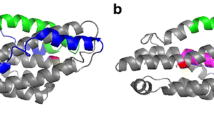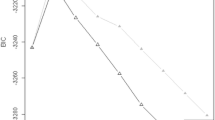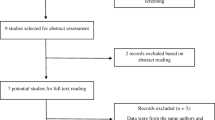Abstract
The effect of the apolipoprotein E (apoE) genotype on the age at onset of Alzheimer's disease (AD) and the relative risk conferred by the apoE ε4 allele were studied in 91 patients and 69 healthy age-matched controls. According to the age of presentation, which varied from 44 to 95 years, subjects were divided into four groups. The inheritance of at least one ɛ4 allele was associated with a significant reduction of the age at onset by 7.7 years among patients who were 83 years or older when examined. A weaker inverse relationship between the ɛ4 allele and the age at onset was also observed among patients who were aged 44–63 years at presentation. The effect of the c4 allele was minimal or absent in the two intermediate age categories. The relative risk of AD conferred by the inheritance of at least one £4 allele showed no consistent age-related pattern. The overall risk expressed as an odds ratio was 5.0 (95% CI 2.4–10.5). With respect to the limitations of the study, we tentatively conclude (1) that the effect of the apoE ɛ4 allele on the age at onset is not restricted to AD patients of a particular age, in accordance with current hypotheses on the role of apoE gene products in the biology of AD; (2) that the relative risk of AD associated with the ɛ4 allele is not significantly modulated by age. Although the apoE ɛ4 allele is an important susceptibility factor for AD occurring in middle age as well as in later life, it is of limited value in routine clinical diagnosis and should not be used for predictive testing in asymptomatic individuals.
Similar content being viewed by others
References
American College of Medical Genetics (1995) Consensus statement: statement on use of apolipoprotein E testing for Alzheimer disease. JAMA 274: 1627–1629
Benjamin R, Leake A, Edwardson JA, McKeith JG, Ince PG, Perry RH, Morris CM (1994) Apolipoprotein E genes in Lewy body and Parkinson's disease. Lancet 343: 1565
Bird TD (1995) Apolipoprotein E genotyping in the diagnosis of Alzheimer's disease: a cautionary view. Ann Neurol 38: 2–4
Chartier-Harlin MC, Parfitt M, Legrain S, Pérez-Tur J, Bousseau T, Evans A, Berr C, Vidal O, Roques P, Gourlet V, et al (1994) Apolipoprotein E, ɛ4-allele as a major risk factor for sporadic early and late-onset forms of Alzheimer's disease: analysis of the 19q13.2 chromosomal region. Hum Mol Genet 3: 569–574
Corder B, Saunders AM, Strittmatter WJ, Haines J, Pericak-Vance MA, Roses AD (1993) Gene dose of apolipoprotein E type 4 allele and the risk of Alzheimer's disease in late onset families. Science 261: 921–923
Corder EH, Saunders AM, Risch NJ, Strittmatter WJ, Schmechel DE, Gaskell PC, Rimmler JB, Locke PA, Coneally PM, Schmader KE, et al (1994) Protective effect of apolipoprotein E type 2 allele for late onset Alzheimer disease. Nature Genet 7: 180–184
Corder EH, Saunders AM, Strittmatter WJ, Schmechel DE, Gaskell PC, Rimmler JB, Locke PA, Coneally PM, Schmader KE, Tanzi RE, et al (1995) Apolipoprotein E, survival in Alzheimer's disease patients, and the competing risks of death and Alzheimer's disease. Neurology 45: 1323–1328
Dai XY, Nanko S, Hattori M, Fukuda R, Nagata K, Isse K, Ueki A, Kazamatsuri H (1994) Association of apolipoprotein E4 with sporadic Alzheimer's disease is more pronounced in early onset type. Neurosci Lett 175: 74–76
Dixon WJ, Brown MB, Engelman L, Jendrich RJ (1990) BMDP Statistical Software. University of California Press, Berkeley
Frisoni GB, Govoni S, Geroldi C, Bianchetti A, Calabresi L, Franceschnini G, Trabucchi M (1995) Gene dose of the e4 allele of apolipoprotein E and disease progression in sporadic late-onset Alzheimer's disease. Ann Neurol 37: 596–604
Galasko D, Saitoh T, Xia Y, Thal LJ, Katzman R, Hill LR, Hansen L (1994) The apolipoprotein E allele e4 is over-represented in patients with the Lewy body variant of Alzheimer's disease. Neurology 44: 1950–1951
Hardy J, Houlden H, Collinge J, Kennedy A, Newman S, Rossor M, Lannfelt L, Lilius L, Winblad B, Crook R, et al (1993) Apolipoprotein E genotype and Alzheimer's disease (letter). Lancet 342: 737–738
Kessler J, Markowitsch HJ, Denzler PE (1990) Mini-Mental-Status-Test. Deutsche Fassung. Beltz, Weinheim
Kurz A, Haupt M, Müllers-Stein M, Zimmer R, Lauter H (1991) Alzheimer-Sprechstunde: Erfahrungen in der Diagnostik und Therapie von organisch bedingten psychischen Störungen. Psychiatr Prax 18: 109–114
Kurz A, Lautenschlager N, Haupt M, Zimmer R, von Thülen B, Altlandt K, Lauter H, Müller U (1994) Das Apolipoprotein-E-e4-Allel ist ein Risikofaktor für die Alzheimer-Krankheit mit frühem und spätem Beginn. Nervenarzt 65:774–779
Kurz A, Egensperger R, Haupt M, Lautenschlager N, Romero B, Graeber MB, Müller U (1996) Apolipoprotein E allele ɛ4, cognitive decline, and deterioration of everyday performance in Alzheimer's disease. Neurology (in press)
Kuusisto J, Koivisto K, Kervinen K, Mykkänen L, Helkala EL, Vanhanen M, Hänninen T, Pyörälä K, Kesäniemi YA, Riekkinen P, et al (1994) Association of apolipoprotein E phenotypes with late onset Alzheimer's disease: population based study. BMJ 309: 636–638
Mayeux R, Stern Y, Ottman R, Tatemichi TK, Tang MX, Maestre G, Ngai C, Tycko B, Ginsberg H (1993) The apolipoprotein ɛ4 allele in patients with Alzheimer's disease. Ann Neurol 34: 752–754
Nalbantoglu J, Gilfix BM, Bertrand P, Robitaille Y, Gauthier S, Rosenblatt DS, Poirier J (1994) Predictive value of apolipoprotein e genotyping in Alzheimer's disease: results of an autopsy series and analysis of several combined studes. Ann Neurol 36: 889–895
Norusis MJ (1990) SPSS for the Macintosh: operations guide. SPSS, Chicago
Rebeck GW, Hyman BT (1995) Apolipoprotein E — correction. Neurology 45: 598
Rebeck GW, Reiter JS, Strickland DK, Hyman BT (1993) Apolipoprotein E in sporadic Alzheimer's disease: allelic variation and receptor interactions. Neuron 11: 575–580
Rebeck GW, Perls TT, West HL, Sodhi P, Lipsitz LA, Hyman BT (1994) Reduced apolipoprotein ɛ4 allele frequency in the oldest old Alzheimer's patients and cognitively normal individuals. Neurology 44: 1513–1516
Roses AD (1994) Apolipoprotein E affects the rate of Alzheimer disease expression: β-amyloid burden is a secondary consequence dependent on apoE genotype and duration of disease. J Neuropathol Exp Neurol 53: 429–437
Roses AD (1995) Apolipoprotein E genotyping in the differential diagnosis, not prediction, of Alzheimer's disease. Ann Neurol 38: 6–14
Saunders AM, Schmader K, Breitner JCS, Benson MD, Brown WT, Goldfarb L, Goldgaber D, Manwaring MG, Szymanski MH, McCown N, et al (1993) Apolipoprotein E ɛ4 allele distributions in late-onset Alzheimer's disease and in other amyloid-forming diseases. Lancet 342: 710–711
Saunders AM, Strittmatter WJ, Schmechel D, St.George-Hyslop PH, Pericak-Vance MA, Joo SH, Rosi BL, Gusella JF, Crapper-MacLachlan DR, Alberts MJ, et al (1993) Association of apolipoprotein E allele e4 with late-onset familial and sporadic Alzheimer's disease. Neurology 43: 1467–1472
Schmechel DEA, Saunders AM, Strittmatter WJ, Crain BJ, Hulette CM, Joo SH, Pericak-Vance MA, Goldgaber D, Roses AD (1993) Increased amyloid b-peptide deposition in cerebral cortex as a consequence of apolipoprotein E genotype in late-onset Alzheimer's disease. Proc Natl Acad Sci USA 90: 9649–9653
Strittmatter WJ, Saunders AM, Schmechel D, Pericak-Vance M, Enghild J, Salvesen GS, Roses AD (1993) Apolipoprotein E: high-avidity binding to beta-amyloid and increased frequency of type 4 allele in late-onset familial Alzheimer disease. Proc Natl Acad Sci USA 90: 1977–1981
Strittmatter WJ, Saunders AM, Goedert M, Weisgraber KH, Dong LM, Jakes R, Huang DY, Pericak-Vance M, Schmechel D, Roses AD (1994) Isoform-specific interactions of apolipoprotein E with microtubule-associated protein tau: implications for Alzheimer's disease. Proc Natl Acad Sci USA 91: 11183–11186
Tsai MS, Tangalos EG, Petersen RC, Smith GE, Schaid DJ, Kokmen E, Ivnik RJ, Thibodeau SN (1994) Apolipoprotein E: risk factor for Alzheimer disease. Am J Hum Genet 54: 643–649
Van Duijn CM, Knijff P de, Cruts M, Wehnert A, Havekes LM, Holman A, van Broeckhoven C (1994) Apolipoprotein e4 allele in a population-based study of early-onset Alzheimer's disease. Nature Genet 7: 74–78
Van Duijn CM, Knijff P de, Wehnert A, Voecht J de, Bronzova JB, Havekes LM, Holman A, Broeckhoven C van (1995) The apolipoprotein E ɛ2 allele is associated with an increased risk of early-onset Alzheimer's disease and a reduced survival. Ann Neurol 37: 605–610
Wenham PR, Price WH, Blundell G (1991) Apolipoprotein E genotyping by one-stage PCR. Lancet 337: 1158–1159
West HL, Rebeck GW, Growdon JH, Hyman BT (1995), Apolipoprotein E4 affects neuropathology but not clinical progression in Alzheimer's disease. In: Igbal K, Mortimer JA, Winblad B, Wisniewski HM (eds) Research advances in Alzheimer's disease and related disorders. Wiley, Chichester, pp 363–370
WHO (1987) I.C.D. 10 — organic, including symptomatic, mental disorders. Diagnostic criteria for research. WHO document number 0645d. World Health Organization, Geneva
Author information
Authors and Affiliations
Corresponding author
Rights and permissions
About this article
Cite this article
Kurz, A., Altland, K., Lautenschlager, N. et al. Apolipoprotein E type 4 allele and Alzheimer's disease: Effect on age at onset and relative risk in different age groups. J Neurol 243, 452–456 (1996). https://doi.org/10.1007/BF00900498
Received:
Revised:
Accepted:
Issue Date:
DOI: https://doi.org/10.1007/BF00900498




